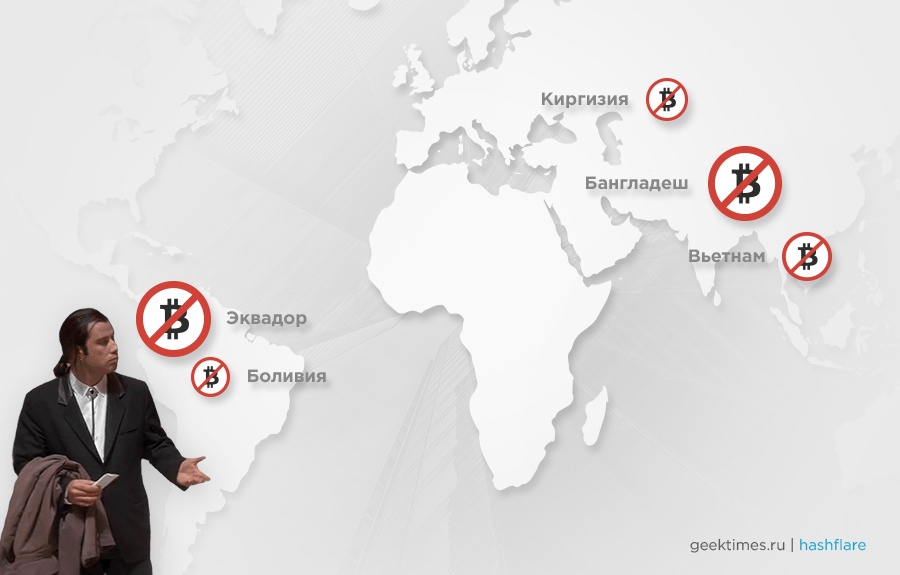Here, after all, it cannot be mined: in which countries of the world cryptocurrencies are prohibited
Most countries in the world have not yet decided on their attitude to cryptocurrencies, and therefore, cryptobusiness there can exist and develop. But there are a number of states that the idea of citizens organizing their financial relations independently, without demand, control and instructions from the authorities, is so annoying that their governments did not experience any doubts when they decided to crush the crypt.

Sounds biased? Bangladesh, Bolivia, Vietnam, Kyrgyzstan, China, Ecuador are not the richest, free and developed countries in the world. Of course, China stands out in all senses - as the largest, one of the richest and most developed countries in the world. But still not the most free. And the position of cryptocurrency in it, as compared with the other five - is still relatively easy.
Yes, the ICO ban was banned (which is not able to exert any strong influence on this market), while the bans on the stock exchanges are only talk. In general, we have been following the situation in China for more than one week and do not believe that there are any reasons to seriously fear a full reversal towards the crypt with our backs. The fact that someone in the Chinese Communist Party simply decided to buy the cuebeats cheaper and then I believe more.
Let's really see where cryptocurrency is still bad. But let's be frank: people do not live there too.
In this country, those who deal with a crypt and other digital “money substitutes” are promised by the legislation for 12 years in prison . All these digital innovations are considered in the country as a means of money laundering. This was announced in 2014 and since then cryptocurrencies remain banned.

Good Bangladeshi passers-by stretch bamboo sticks to help the fallen passer get up while the others wave around the flies
“Bitcoin is not a legal means of payment in any country. Any transaction using Bitcoin or any digital currency is a punishable act, ”said the head of the Central Bank of Bangladesh three years ago.
The basis of the ban - several articles of the law on finance, adopted in 1947.
The country's central bank banned any operations with bitcoins in 2014. Recently, the government recalled the ban, saying that cryptomonettes are a threat to the national currency and cannot be used. Actually, here generally strictly refer to any means of payments that are not controlled by the state.

- Go to meni in your yard!
“Any currency that is not released and not controlled by the government or the relevant authority is outlawed,” the 2014 Central Bank said in a statement.
This Latin American country decided to ban any bitcoin operations in 2014. As in Bolivia, Bitcoins and other cryptocurrencies were considered a threat to national security in Ecuador. But, unlike Bolivia, they went further and created their own digital currency, which, of course, is completely controlled by the government.
All other digital means of payment were prohibited . A law was passed that imposes a ban on "issuing or any transactions with any surrogates of money." Violators are promised to be punished, and all that they find from those who decide to break the law is to confiscate.
Interestingly, in Ecuador, the official means of payment is US dollars. And the national cryptocurrency is tied to the dollar.
True, citizens of the country work with Bitcoin, despite the prohibitions .
In this country, bitcoin can not be used as a means of payment. In the same 2014, the National Bank of the country issued a decree, which stated that the use of Bitcoin or other cryptocurrencies is illegal, since the only official payment method in the country is Kyrgyz som.

Any attempt to use cryptocurrency to pay in the country is regarded as a violation of the law. Over time, the authorities have ceased to react too aggressively to cryptocurrency. In the near future , even the release of a national cryptocurrency is planned .
In February 2014, the government banned institutional organizations from working with Bitcoin. True, ordinary citizens without problems could and can work with Bitcoin, there are no restrictions. Plus, Vietnam decided to lift the ban for organizations. All changes to the legislation should be made before December of this year. So next year, in order to count the countries where Bitcoin and other cryptocurrencies are still prohibited, fingers on Homer Simpson’s hand are enough:

That's all. Whatever choice China makes over the crypt, it is already clear that the future belongs to a cryptocurrency. Or, at least, a comfortable place is definitely reserved for her there.
Many countries are already developing proposals for incorporating work with cryptocurrencies into the legal field (that is, this activity should be regulated in one way or another by the state). Such bills are being prepared in the USA, Great Britain, the European Union and in many other countries. Therefore, no matter how hard the PRC tries, the course of the same Bitcoin, even after a strong fall, is quickly restored .
Because if the country that hated the crypt is small, then no one notices. And if it is very large, then any attempts to drive the genie back into the bottle, lead to the fact that miners and exchanges from other countries are activated. Hardly that - and the streams of cryptomonet change their configuration, which indicates the gradual creation of adaptation mechanisms, characteristic of the market for common currencies. And most importantly: remember our article about "safe haven" ? If the world now seems calmer than a year ago, then look again. People began to trust states so much less that even the attempts of states to attack cryptocurrency themselves only increase their flight there - because this only proves the advantages of distributed, decentralized systems with predictable emission of currencies.
In general, as you wish, we believe in the crypt. And you?


Sounds biased? Bangladesh, Bolivia, Vietnam, Kyrgyzstan, China, Ecuador are not the richest, free and developed countries in the world. Of course, China stands out in all senses - as the largest, one of the richest and most developed countries in the world. But still not the most free. And the position of cryptocurrency in it, as compared with the other five - is still relatively easy.
Yes, the ICO ban was banned (which is not able to exert any strong influence on this market), while the bans on the stock exchanges are only talk. In general, we have been following the situation in China for more than one week and do not believe that there are any reasons to seriously fear a full reversal towards the crypt with our backs. The fact that someone in the Chinese Communist Party simply decided to buy the cuebeats cheaper and then I believe more.
If we take up this issue only half a year earlier, we would have got a much more curious participant in this compilation: Iceland. And the article itself would be called “Bangladesh, Bolivia, Vietnam, Kyrgyzstan, China, Ecuador and Iceland in the film“ What does Iceland do here? ” In one of the most liberal countries in the world, Bitcoin was slightly curtailed by the law prohibiting the national currency, the Icelandic krona leave the country. Therefore, until March 2017, the descendants of the Vikings were forbidden to trade in pairs of Bitcoin / Icelandic krone. However, in April 2017, the Icelandic Central Bank allowed citizens to freely work with cryptocurrency.
If you doubted the future of cryptocurrency - take a look at the list of countries in which they are prohibited
Let's really see where cryptocurrency is still bad. But let's be frank: people do not live there too.
Bangladesh
Population: 161 million;
GDP per capita: $ 1,411;
Lifespan: 71.8 years;
Annual inflation: 8.8%
In this country, those who deal with a crypt and other digital “money substitutes” are promised by the legislation for 12 years in prison . All these digital innovations are considered in the country as a means of money laundering. This was announced in 2014 and since then cryptocurrencies remain banned.

Good Bangladeshi passers-by stretch bamboo sticks to help the fallen passer get up while the others wave around the flies
“Bitcoin is not a legal means of payment in any country. Any transaction using Bitcoin or any digital currency is a punishable act, ”said the head of the Central Bank of Bangladesh three years ago.
The basis of the ban - several articles of the law on finance, adopted in 1947.
Bolivia
Population: 11.410 million;
GDP per capita: $ 3,094;
Lifespan: 70.7 years;
Annual inflation: 4.6%
The country's central bank banned any operations with bitcoins in 2014. Recently, the government recalled the ban, saying that cryptomonettes are a threat to the national currency and cannot be used. Actually, here generally strictly refer to any means of payments that are not controlled by the state.

- Go to meni in your yard!
“Any currency that is not released and not controlled by the government or the relevant authority is outlawed,” the 2014 Central Bank said in a statement.
Ecuador
Population: 15.6 million;
GDP per capita: $ 6003;
Lifespan: 75.3 years;
Annual inflation: 5.3%
This Latin American country decided to ban any bitcoin operations in 2014. As in Bolivia, Bitcoins and other cryptocurrencies were considered a threat to national security in Ecuador. But, unlike Bolivia, they went further and created their own digital currency, which, of course, is completely controlled by the government.
All other digital means of payment were prohibited . A law was passed that imposes a ban on "issuing or any transactions with any surrogates of money." Violators are promised to be punished, and all that they find from those who decide to break the law is to confiscate.
Interestingly, in Ecuador, the official means of payment is US dollars. And the national cryptocurrency is tied to the dollar.
True, citizens of the country work with Bitcoin, despite the prohibitions .
Kyrgyzstan
Population: 6 million;
GDP per capita: $ 1,073;
Lifespan: 69 years;
Annual inflation: 4%
In this country, bitcoin can not be used as a means of payment. In the same 2014, the National Bank of the country issued a decree, which stated that the use of Bitcoin or other cryptocurrencies is illegal, since the only official payment method in the country is Kyrgyz som.

Any attempt to use cryptocurrency to pay in the country is regarded as a violation of the law. Over time, the authorities have ceased to react too aggressively to cryptocurrency. In the near future , even the release of a national cryptocurrency is planned .
Vietnam
Population: 95.6 million;
GDP per capita: $ 2,111;
Lifespan: 76 years;
Annual inflation: 9.2%
In February 2014, the government banned institutional organizations from working with Bitcoin. True, ordinary citizens without problems could and can work with Bitcoin, there are no restrictions. Plus, Vietnam decided to lift the ban for organizations. All changes to the legislation should be made before December of this year. So next year, in order to count the countries where Bitcoin and other cryptocurrencies are still prohibited, fingers on Homer Simpson’s hand are enough:

That's all. Whatever choice China makes over the crypt, it is already clear that the future belongs to a cryptocurrency. Or, at least, a comfortable place is definitely reserved for her there.
Many countries are already developing proposals for incorporating work with cryptocurrencies into the legal field (that is, this activity should be regulated in one way or another by the state). Such bills are being prepared in the USA, Great Britain, the European Union and in many other countries. Therefore, no matter how hard the PRC tries, the course of the same Bitcoin, even after a strong fall, is quickly restored .
Because if the country that hated the crypt is small, then no one notices. And if it is very large, then any attempts to drive the genie back into the bottle, lead to the fact that miners and exchanges from other countries are activated. Hardly that - and the streams of cryptomonet change their configuration, which indicates the gradual creation of adaptation mechanisms, characteristic of the market for common currencies. And most importantly: remember our article about "safe haven" ? If the world now seems calmer than a year ago, then look again. People began to trust states so much less that even the attempts of states to attack cryptocurrency themselves only increase their flight there - because this only proves the advantages of distributed, decentralized systems with predictable emission of currencies.
In general, as you wish, we believe in the crypt. And you?

All Articles